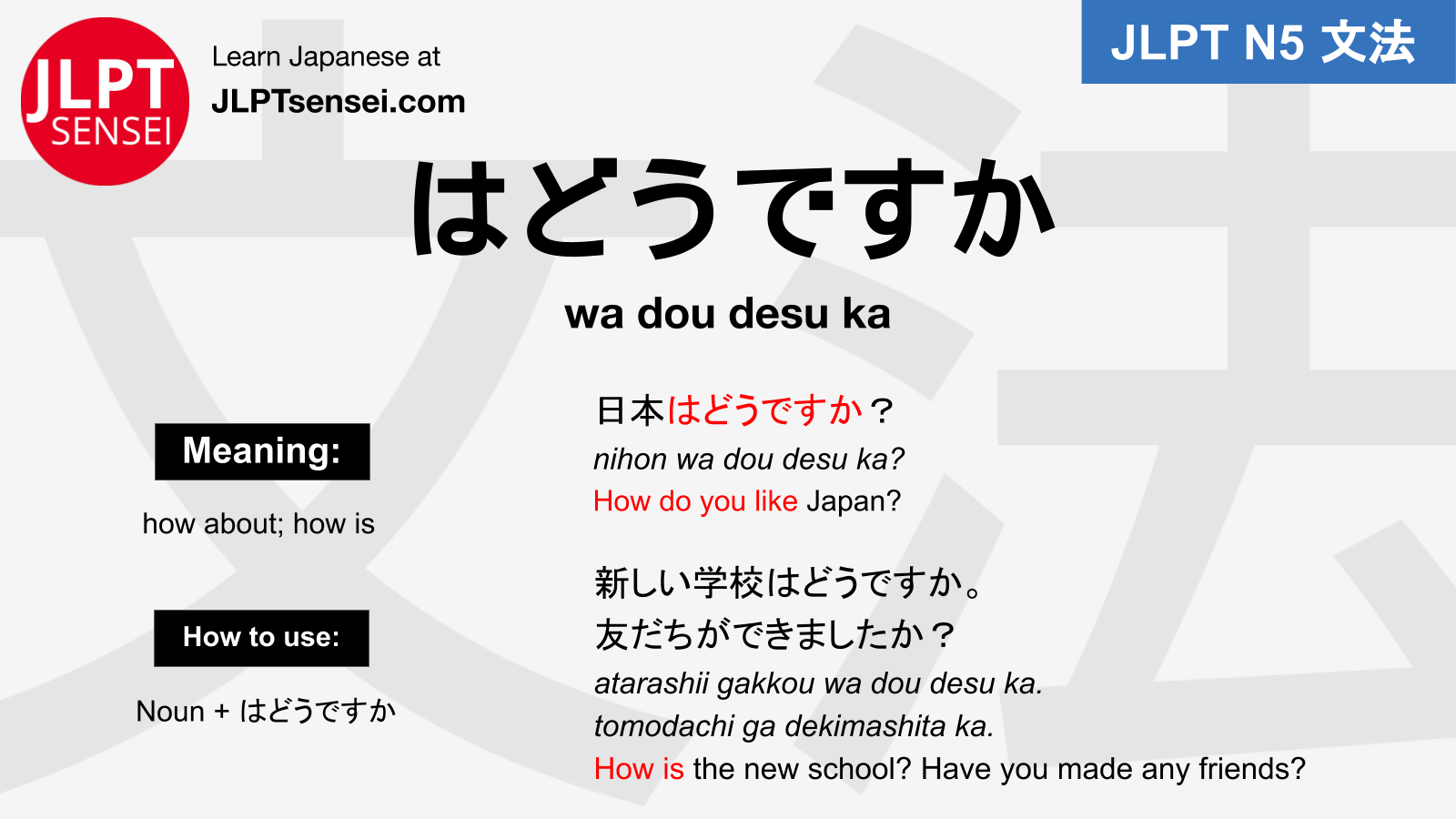Have you ever watched a Japanese anime or drama and wondered about the phrase “Desu ka?” It’s a seemingly simple phrase, yet it holds a world of cultural nuance and politeness. It’s not merely a question mark at the end of a sentence; it’s a doorway to understanding how Japanese people interact and express themselves.

Image: jlptsensei.com
This article delves into the depths of “desu ka,” unraveling its origins, exploring its various applications, and guiding you towards a deeper appreciation of this ubiquitous phrase. Prepare to embark on a linguistic journey that will leave you with a newfound appreciation for the intricacies of Japanese language and culture.
Desu ka: More Than Just a Question
“Desu ka” translates directly to “Is it?” or “Is it so?” It’s the polite form of “da ka” which is generally considered casual and often used among close friends or family. “Desu ka” is a versatile phrase that can function as a simple confirmation, an inquiry for clarification, or a gentle expression of interest.
The key to understanding “desu ka” lies in its context. It’s not always directly translated as a question, but it can carry a wide range of meanings depending on the situation. It’s a linguistic tool that allows for subtle communication and respectful interaction.
A Glimpse into Japanese Politeness Culture
“Desu ka” is a cornerstone of Japanese politeness, a culture that values harmony and respect. The phrase signifies a desire to connect and engage with the other person politely. Even if you’re unsure about something, “desu ka” allows you to express your interest in a respectful and non-confrontational manner.
Imagine you’re shopping for souvenirs in Japan and you want to check the price of a specific item. Simply asking “Ikura desu ka?” (How much is it?) is more polite than directly asking “How much?” The use of “desu ka” adds a layer of courtesy and consideration that makes the interaction more comfortable and harmonious.
Beyond Confirmation: Exploring the Nuances of “Desu ka”
While “desu ka” often serves as a confirmation, it can also subtly convey different intentions:
1. Seeking Confirmation and Agreement:
- “Kore wa pen desu ka?” (Is this a pen?) This is a simple confirmation question.
- “Kyou wa atsui desu ka?” (Is it hot today?) This seeks to confirm a shared observation.
2. Expressed Interest and Engagement:
- “Oishii desu ka?” (Is it delicious?) This inquiry shows interest in another person’s experience.
3. Seeking Clarification:
- “Nanji ni dekakemasu ka?” (What time are you leaving?) This seeks specific information.
4. Expressing Surprise or Doubt:
- “Hontou desu ka?” (Really?) This can convey surprise or skepticism.
5. A Reminder of Courtesy:
- “Ogenki desu ka?” (How are you?) This is a polite greeting, akin to “How are you doing?” in English.

Image: www.youtube.com
Mastering the Art of Using “Desu ka”
When learning to use “desu ka,” it’s important to grasp the nuances and subtle implications. Pay close attention to the context, body language, and tone of voice to understand the speaker’s true intent. Here are some additional tips:
- Pronunciation: Pay attention to the correct intonation. The emphasis usually falls on the “ka”.
- Listen for Tone: Japanese language often relies on tone for meaning. Pay close attention to how “desu ka” is said, as it can indicate excitement, doubt, or simply a polite question.
- Practice Makes Perfect: Listen to Japanese conversations, watch films, and practice saying “desu ka” in different scenarios.
The Value of “Desu ka” Beyond Language
“Desu ka” is a reflection of Japanese cultural values that emphasize politeness, consideration, and harmonious interaction. Mastering the use of this phrase demonstrates respect and helps bridge cultural gaps.
Learning “desu ka” opens doors to deeper understanding and meaningful connections with those who speak Japanese. By embracing this seemingly simple phrase, you gain access to a rich tapestry of language and culture, deepening your appreciation for the beauty and complexity of Japanese communication.
Desu Ka Japanese
Embrace the Journey of Linguistic Discovery
“Desu ka” is more than just a question; it’s a window into the heart of Japanese culture. It’s a gentle reminder to be mindful of another person’s feelings and to engage with them with respect and consideration.
As you continue your journey learning Japanese, remember to explore the finer nuances of language. Embrace the challenge of understanding cultural cues and embrace the opportunity to connect with others on a deeper level. The journey of learning a new language is a rewarding one, and “desu ka” is a key that unlocks countless doors to understanding and appreciation.





